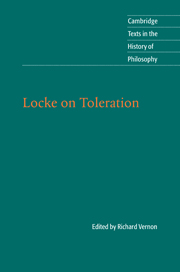Book contents
- Frontmatter
- Contents
- Acknowledgements
- Introduction
- Chronology
- Further reading
- Note on the texts and translation
- Locke on Toleration
- Locke: A Letter concerning Toleration
- Locke: From the Second Treatise (in Two Treatises of Government, 2nd edn, 1698)
- Locke: From An Essay concerning Human Understanding (4th edn, 1700)
- Proast: The Argument of the Letter concerning Toleration, Briefly Considered and Answered (1690)
- Locke: From A Second Letter concerning Toleration (1690)
- Proast: From A Third Letter concerning Toleration in Defence of the Argument of the Letter concerning Toleration, Briefly Considered and Answered (1691)
- Locke: From A Third Letter for Toleration (1692)
- Proast: From A Second Letter to the Author of the Three Letters for Toleration (1704)
- Locke: From A Fourth Letter for Toleration (1704)
- Index
- Titles in the series
- References
Locke: A Letter concerning Toleration
Published online by Cambridge University Press: 05 June 2012
- Frontmatter
- Contents
- Acknowledgements
- Introduction
- Chronology
- Further reading
- Note on the texts and translation
- Locke on Toleration
- Locke: A Letter concerning Toleration
- Locke: From the Second Treatise (in Two Treatises of Government, 2nd edn, 1698)
- Locke: From An Essay concerning Human Understanding (4th edn, 1700)
- Proast: The Argument of the Letter concerning Toleration, Briefly Considered and Answered (1690)
- Locke: From A Second Letter concerning Toleration (1690)
- Proast: From A Third Letter concerning Toleration in Defence of the Argument of the Letter concerning Toleration, Briefly Considered and Answered (1691)
- Locke: From A Third Letter for Toleration (1692)
- Proast: From A Second Letter to the Author of the Three Letters for Toleration (1704)
- Locke: From A Fourth Letter for Toleration (1704)
- Index
- Titles in the series
- References
Summary
My distinguished friend,
You ask me for my opinion of mutual toleration among Christians. I reply in a word that it seems to me to be the principal mark of the true church. Antiquity of titles and places of worship which some people boast of, the reformation of doctrine that others stress, the orthodoxy of one's faith that everyone claims (for everyone is orthodox in their own eyes) – these things are likely to be signs of competition for power and dominion rather than marks of Christ's church. A person may have all of them and still not be a Christian, if he lacks charity, gentleness, and goodwill toward all human beings and toward those who profess the Christian faith in particular.
‘The kings of the Gentiles exercise lordship over them,’ says our Saviour to his disciples, ‘but ye shall not be so’ (Luke 22: [25], 26). True religion has a different object. It did not come into the world in order to establish outward pomp and ecclesiastical domination and violence, but to ground a life of goodness and piety. Anyone who wishes to enlist in Christ's church must, more than anything else, declare war on his own vices, on his own pride and lust. Without holiness of life, purity of morals, goodness of heart, and gentleness, any aspiration to the name of Christian is unjustified.
- Type
- Chapter
- Information
- Locke on Toleration , pp. 3 - 46Publisher: Cambridge University PressPrint publication year: 2010
References
- 4
- Cited by

